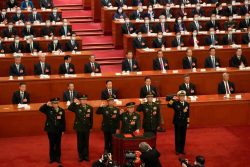China Tells Tech Manufacturers to Stop Using Micron Chips, Stepping Up Feud with United States

A sign marks the entrance of the Micron Technology automotive chip manufacturing plant on Feb. 11, 2022, in Manassas, Va.
10:35 JST, May 22, 2023
BEIJING (AP) — Stepping up a feud with Washington over technology and security, China’s government on Sunday told users of computer equipment deemed sensitive to stop buying products from the biggest U.S. memory chipmaker, Micron Technology Inc.
Micron products have unspecified “serious network security risks” that pose hazards to China’s information infrastructure and affect national security, the Cyberspace Administration of China said on its website. Its six-sentence statement gave no details.
“Operators of critical information infrastructure in China should stop purchasing products from Micron Co.,” the agency said.
The United States, Europe and Japan are reducing Chinese access to advanced chipmaking and other technology they say might be used in weapons at a time when President Xi Jinping’s government has threatened to attack Taiwan and is increasingly assertive toward Japan and other neighbors.
Chinese officials have warned of unspecified consequences but appear to be struggling to find ways to retaliate without hurting China’s smartphone producers and other industries and efforts to develop its own processor chip suppliers.
An official review of Micron under China’s increasingly stringent information security laws was announced April 4, hours after Japan joined Washington in imposing restrictions on Chinese access to technology to make processor chips on security grounds.
Foreign companies have been rattled by police raids on two consulting firms, Bain & Co. and Capvision, and a due diligence firm, Mintz Group. Chinese authorities have declined to explain the raids but said foreign companies are obliged to obey the law.
Business groups and the U.S. government have appealed to authorities to explain newly expanded legal restrictions on information and how they will be enforced.
Sunday’s announcement appeared to try to reassure foreign companies.
“China firmly promotes high-level opening up to the outside world and, as long as it complies with Chinese laws and regulations, welcomes enterprises and various platform products and services from various countries to enter the Chinese market,” the cyberspace agency said.
Xi accused Washington in March of trying to block China’s development. He called on the public to “dare to fight.”
Despite that, Beijing has been slow to retaliate, possibly to avoid disrupting Chinese industries that assemble most of the world’s smartphones, tablet computers and other consumer electronics. They import more than $300 billion worth of foreign chips every year.
Beijing is pouring billions of dollars into trying to accelerate chip development and reduce the need for foreign technology. Chinese foundries can supply low-end chips used in autos and home appliances but can’t support smartphones, artificial intelligence and other advanced applications.
The conflict has prompted warnings the world might decouple, or split into separate spheres with incompatible technology standards that mean computers, smartphones and other products from one region wouldn’t work in others. That would raise costs and might slow innovation.
U.S.-Chinese relations are at their lowest level in decades due to disputes over security, Beijing’s treatment of Hong Kong and Muslim ethnic minorities, territorial disputes and China’s multibillion-dollar trade surpluses.
Top Articles in News Services
-

Survey Shows False Election Info Perceived as True
-

Hong Kong Ex-Publisher Jimmy Lai’s Sentence Raises International Outcry as China Defends It
-

Japan’s Nikkei Stock Average Touches 58,000 as Yen, Jgbs Rally on Election Fallout (UPDATE 1)
-

Japan’s Nikkei Stock Average Falls as US-Iran Tensions Unsettle Investors (UPDATE 1)
-

Japan’s Nikkei Stock Average Rises on Tech Rally and Takaichi’s Spending Hopes (UPDATE 1)
JN ACCESS RANKING
-

Producer Behind Pop Group XG Arrested for Cocaine Possession
-

Japan PM Takaichi’s Cabinet Resigns en Masse
-

Man Infected with Measles Reportedly Dined at Restaurant in Tokyo Station
-

Israeli Ambassador to Japan Speaks about Japan’s Role in the Reconstruction of Gaza
-

Videos Plagiarized, Reposted with False Subtitles Claiming ‘Ryukyu Belongs to China’; Anti-China False Information Also Posted in Japan

























